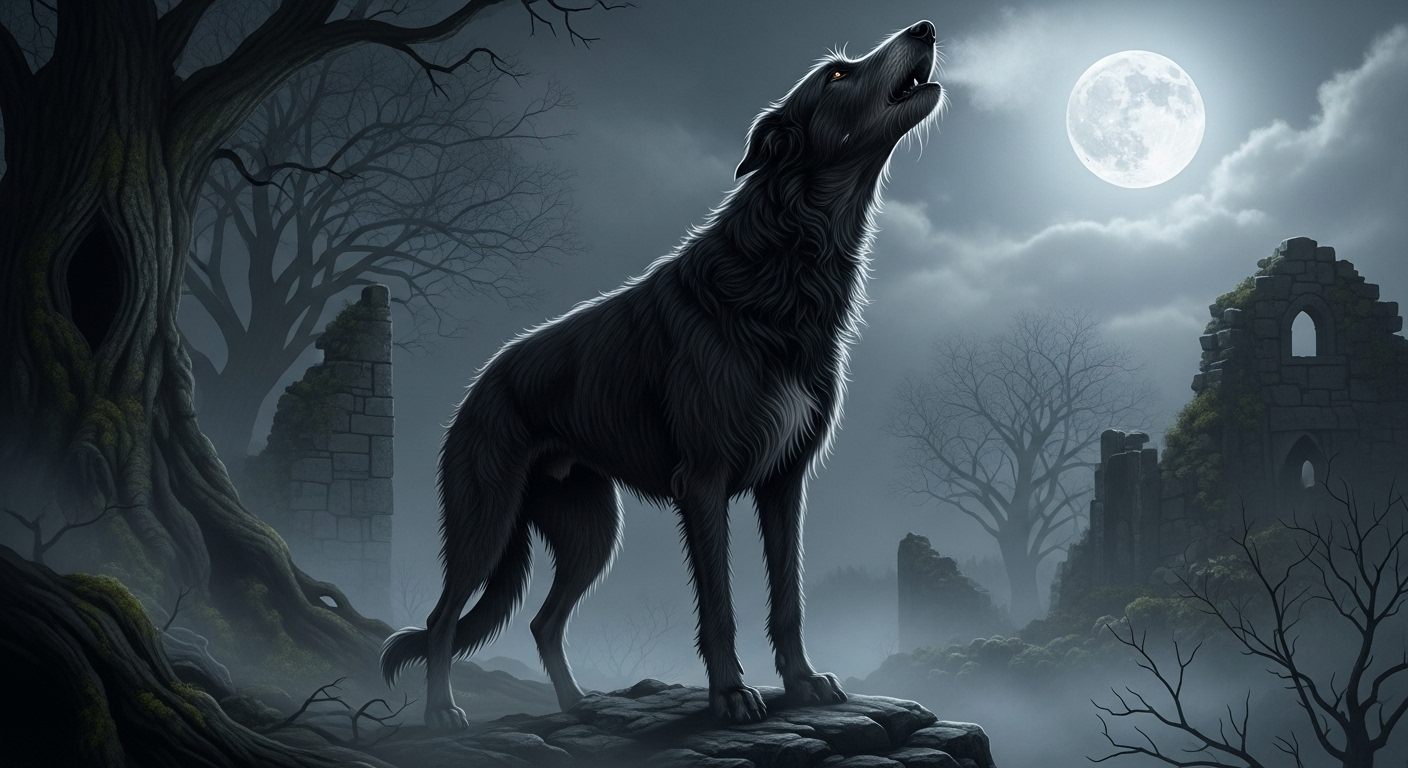When your dog suddenly erupts into a fit of barking at what appears to be an empty space, it can be both puzzling and a little unsettling. While modern science offers logical explanations for these seemingly unprovoked canine vocalizations, many cultures have long held deep-seated superstitions, interpreting such barks and howls as potent omens, particularly of impending death. This article delves into both the scientific reasons behind dogs barking at ‘nothing’ and the rich tapestry of folklore connecting canine cries to the spiritual realm.
I. The Scientific Side: Why Dogs Bark at ‘Nothing’
What appears to be barking at nothing often has a specific, explainable trigger that humans simply cannot perceive. Dogs possess senses far more acute than our own, allowing them to detect a wealth of information in their environment that escapes human notice.
A. Heightened Sensory Perception
- Superior Hearing: Dogs can hear higher-pitched sounds and much softer sounds at greater distances than humans¹. They might be reacting to distant sirens, the scurrying of rodents within walls, or other faint environmental noises.
- Acute Sense of Smell: With up to 40 times more olfactory receptors than humans, dogs can detect subtle scents of animals (even those long gone), changes in air pressure, or other environmental shifts².
- Enhanced Vision in Low Light: Dogs have more rods in their retinas and a reflective layer called the tapetum lucidum, allowing them to see in much dimmer conditions than humans. What looks like a dark, empty space to us may be full of shapes and movement to a dog.

B. Environmental Triggers You Might Miss
- Subtle movements or distant sounds from outside your home, such as a car door slamming, a bird rustling leaves, or even imperceptible vibrations, can easily catch a dog’s attention and prompt a vocal response.
- The presence of small animals like mice or insects, or unfamiliar scents carried by the wind, can also be triggers for seemingly unprovoked barking.
C. Behavioral and Emotional Factors
- Fear or Anxiety: A dog might bark due to fear of unfamiliar sounds, objects, people, or situations. This can include separation anxiety when left alone, leading to distress vocalizations.
- Excitement: Barking can be an expression of pure enthusiasm, such as anticipating a walk, the arrival of a favorite person, or playtime.
- Attention-Seeking: Many dogs learn that barking gets a reaction. If this behavior has been reinforced in the past, they may bark to solicit interaction, playtime, or food from their owners.
- Boredom and Under-stimulation: A lack of physical exercise or mental engagement can lead to a dog barking as an outlet for pent-up energy, frustration, or simply to entertain themselves.
- Territorial Instincts: A dog’s innate desire to protect its space, whether that’s the home or yard, can lead to barking at perceived intruders, even if they are distant or non-threatening from a human perspective.
- Disobedience: Sometimes, excessive barking can stem from unclear boundaries or a lack of consistent leadership and training.
D. Underlying Medical Conditions
- Pain or Disorientation: Physical distress, discomfort, or confusion can cause dogs to vocalize more than usual, especially if they are wandering aimlessly or pacing.
- Canine Cognitive Dysfunction (Dementia): Older dogs may exhibit random barking, particularly at night, as a symptom of cognitive decline, similar to human dementia³.
- Compulsive Disorders: In some cases, persistent barking with no discernible trigger can be a sign of a compulsive disorder, requiring veterinary attention.

II. The Spiritual and Superstitious: Dogs as Omens of Death
Beyond scientific explanations, the belief that a dog’s barking or howling is a death omen is an ancient and widely held superstition across many cultures. These beliefs often reflect a profound reverence for dogs and their perceived connection to realms beyond our comprehension.
A. Dogs’ ‘Sixth Sense’ and Connection to the Spirit World
- Many spiritual traditions believe dogs possess heightened intuition or psychic abilities, allowing them to sense unseen spirits, spiritual presences, or even impending death.
- Dogs are often seen as guardians or conduits between the physical and spiritual realms, making their unusual vocalizations particularly significant.
B. Historical and Cultural Beliefs
- Ancient Egypt: The god Anubis, associated with the dead and mummification, was depicted with a jackal or dog head. A howling dog was believed to be calling a soul to Anubis.
- Greek Mythology: Dogs were closely linked to Hecate, the goddess of darkness and crossroads, and her approach was often heralded by barking. Cerberus, the three-headed dog, famously guarded the underworld.
- Norse Mythology: Legends mention Garmr, a fearsome hound guarding Hel (the realm of the dead), and dogs howling at the approach of Freyja (goddess of death) riding her chariot pulled by cats.
- Irish Folklore: Some believed dogs howled because they heard the spectral pack of hounds collecting the souls of the dying.
- English Folklore: The legend of the Black Dog (e.g., Black Shuck) describes spectral hounds whose appearance presages misfortune or death.
- Native American Cultures: Dogs are often seen as closely involved in the cycle of life and death, and their howling is a form of communication about what is to come.
- Various Traditions: Beliefs persist in regions like the Philippines and the Southern United States, where dogs barking or howling at night specifically signifies a recent or impending death⁴.

C. Specific Interpretations of Barking/Howling
- Howling for No Apparent Reason: This is often believed to indicate a dog seeing unseen spirits or entities.
- Howling Outside a Sick Person’s Home: A direct omen of that person’s inevitable death is sometimes interpreted if a dog persists in howling outside a home where someone is ill, particularly if the dog cannot be driven away.
- Howling at Crossroads: In some traditions, this suggests the presence of powerful deities associated with the underworld or magic, like Hecate.
- Specific Numbers of Howls: Superstitions can even dictate the meaning by quantity; an odd number (e.g., one or three) may mark a death nearby, while four howls under a porch could be a harbinger of death⁵.

D. Broader Spiritual Meanings (Beyond Death)
While often associated with death, a dog’s unusual vocalizations can also carry other spiritual messages:
- Warning or Protection: A dog’s bark can be interpreted as a spiritual warning against potential threats, negative energies, or dangers in the environment, urging vigilance. They might be protecting their human from unseen malevolence.
- Alerting to Spiritual Presences: Dogs may simply be sensing spiritual energies or entities around them, not necessarily negative, but simply present.
- Guidance and Insight: Barking might convey a spiritual message or guidance, prompting one to pay attention to intuition or make a specific decision. It could be a nudge from the universe.
- Energetic Cleansing: Some believe persistent barking indicates a need for energetic clearing or cleansing of a space from lower vibrations, much like a spiritual alarm.
- Call for Awareness: A dog’s persistent barking can be a spiritual reminder to be present, aware of surroundings, and mindful of messages in life, encouraging us to look beyond the obvious.

III. What to Do When Your Dog Barks at ‘Nothing’
Whether you lean towards scientific explanations or spiritual interpretations, understanding your dog’s behavior is key to addressing the issue and fostering a harmonious relationship.
A. Investigate Scientific Causes First
- Observe your dog’s body language for signs of fear, anxiety, or pain. Their posture, tail position, and ear movements can tell you a lot.
- Rule out environmental triggers by actively checking for subtle sounds, smells, or movements you might have missed both inside and outside your home.
- Ensure your dog receives adequate physical exercise and mental stimulation to combat boredom and reduce excess energy that might manifest as barking.
- Address behavioral issues like attention-seeking or territoriality through consistent training, clear boundaries, and positive reinforcement. Avoid inadvertently rewarding unwanted barking.
- Consult a veterinarian to rule out any underlying medical conditions, especially for older dogs or if there are sudden, uncharacteristic changes in behavior.
B. Acknowledge Cultural and Spiritual Perspectives
- If you are inclined to believe in spiritual meanings, consider the context and your own intuition regarding the messages your dog might be conveying.
- Recognize that these beliefs reflect a deep historical connection between humans and dogs, often attributing them with powers beyond our own, adding a layer of mystery and respect to their actions.

IV. Conclusion
The phenomenon of dogs barking at ‘nothing’ bridges the gap between the empirically verifiable and the mystically intriguing. While scientific understanding points to their superior senses and emotional complexities as key factors in their behavior, cultural folklore imbues these actions with profound spiritual significance, often as harbingers of life’s most final transition or as spiritual warnings. Understanding both perspectives allows for a richer appreciation of our canine companions and the enduring mysteries they seem to perceive. END



